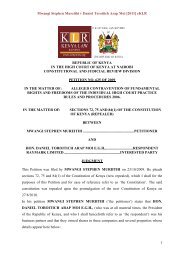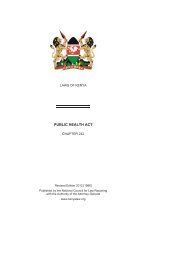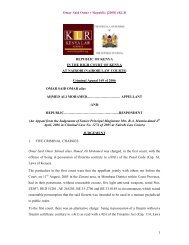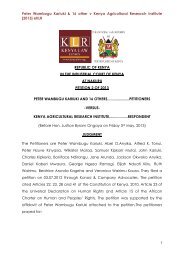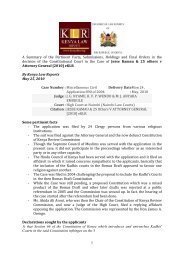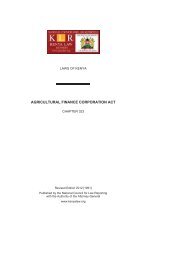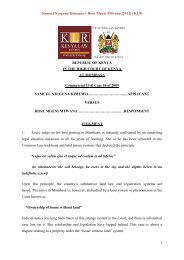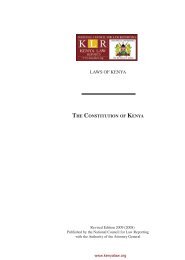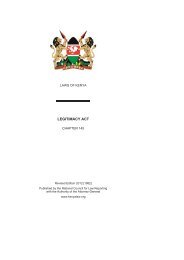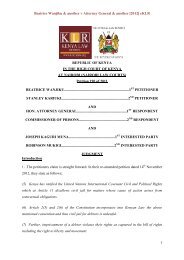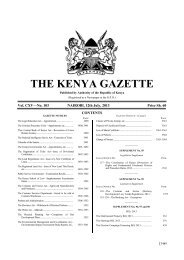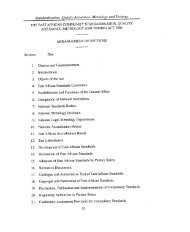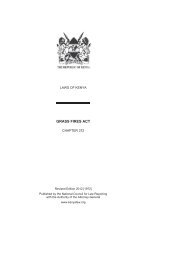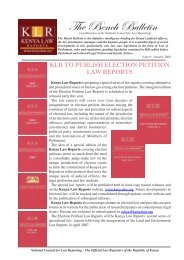Bench Bulletin - Issue 12 - Kenya Law Reports
Bench Bulletin - Issue 12 - Kenya Law Reports
Bench Bulletin - Issue 12 - Kenya Law Reports
You also want an ePaper? Increase the reach of your titles
YUMPU automatically turns print PDFs into web optimized ePapers that Google loves.
KENYA LAW REPORTS<br />
BENCH BULLETIN<br />
FROM THE COURTS — COURT OF APPEAL<br />
Termination of Employment<br />
Jimi Masege v <strong>Kenya</strong> Airways Limited<br />
Civil Application 63 of 2003<br />
Court of Appeal at Nairobi<br />
Omolo, Waki & Onyango Otieno, JJ.A<br />
June 11, 2010<br />
Reporter: Monica Achode<br />
Case History<br />
An appeal from the judgment of the High court of <strong>Kenya</strong> at Nairobi (Kuloba, J.) dated 25th July, 2000 in H.C.C.C. NO.<br />
1165 OF 1998<br />
The Hon. Mr. Justice<br />
W. Onyango Otieno<br />
Employment – termination of – appeal against a decision finding the termination of appellant’s<br />
employment lawful and on disciplinary grounds – claims over rebate tickets – respondent<br />
having argued that the rebate tickets were concessionary and only a privilege to staff – claims<br />
that they could be changed or withdrawn or augmented by the respondent as deemed fit –<br />
circumstances under which the appellate court would find differently from a superior court<br />
– whether the appellant had an litigable entitlement to the tickets<br />
Tort – libel – appeal against an award for damages paid to the appellant by the superior<br />
court – appellant having claimed that the respondent circulated a defamatory memo about<br />
him – respondent failing to refute the appellant’s claims – guidelines when testing matters of<br />
libel – principles guiding awards to damages – whether KQ was liable for defamation – whether<br />
the appellant was entitled to damages<br />
The appellant brought an appeal against a high court decision declaring his dismissal from<br />
the respondent’s employment lawful. The appellant had also sued the respondent for libel<br />
for sending out an allegedly defamatory memo to other staff members warning them not to associate with him. The<br />
appellant had been terminated on disciplinary grounds although the respondent chose to pay him his terminal benefits.<br />
The appellant also claimed rebated tickets which he argued, were an entitlement of the employee who, him, had worked<br />
in excess of ten years and had either left on retirement, termination or reassignment. It was his contention that this<br />
was his right and not a privilege and the respondent had to surrender the same to him. Neither party exhibited the<br />
terms of appointment and the provisions therein relating to termination of employment.<br />
Held:<br />
1. Although the Court on appeal would not lightly differ from the judge at first instance on a finding of fact it was<br />
undeniable that it had the power to examine and re-evaluate the evidence on a first appeal if it became necessary. It<br />
was a strong thing for an appellate court to differ from the finding, on a question of fact, of the judge who tried the<br />
case, and who had had the advantage of seeing and hearing the witness.<br />
2. The letter of termination was clearly predicated on various incidents of indiscipline cited by the respondent<br />
therefore the appellant’s employment was lawfully terminated and was terminated on disciplinary grounds. The<br />
appellant therefore did not have litigable entitlement to the rebate tickets.<br />
3. In an action for libel, the trial court in assessing damages is entitled to look at the whole conduct of the defendant<br />
from the time libel was published down to the time the verdict is given. It may consider what his conduct has been<br />
before action, after action, and in court during the trial<br />
4. The guidelines when testing matters of libel were; the objective features of the libel itself, such as its gravity, its<br />
province, the circulation of the medium in which it is published, and any repetition, the subjective effect on the plaintiff’s<br />
feelings not only from the prominence itself but from the defendant’s conduct thereafter both up to and including<br />
the trial itself, matters tending to mitigate damages, such as the publication of an apology, matters tending to reduce<br />
damages and vindication of the plaintiff’s reputation past and future.<br />
5. Under those tests the damages awarded by the superior court were neither inordinately too high nor inordinately<br />
too low to warrant interference by the appellate court. There was no error in principle.<br />
Appeal and cross appeal dismissed.<br />
<strong>Issue</strong> <strong>12</strong>: April-June 2010<br />
41



